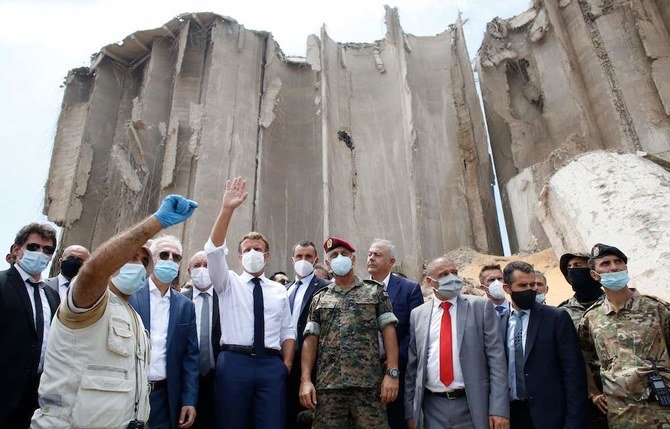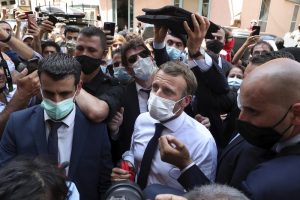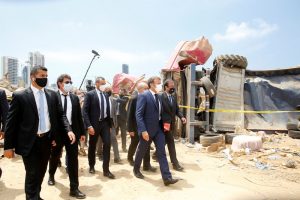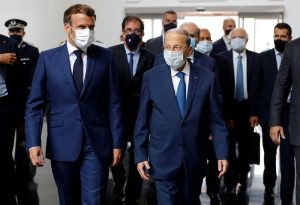
- ARAB NEWS
- 11 Jul 2025

BEIRUT: French President Emmanuel Macron visited shell-shocked Beirut Thursday, pledging support and urging change after a massive explosion devastated the Lebanese capital in a disaster that has sparked grief and fury.
“Lebanon is not alone,” he tweeted on arrival before pledging Paris would coordinate international relief efforts after the colossal blast killed at least 137 people, wounded thousands and caused billions of dollars in damage.
But Macron also warned that Lebanon — already mired in a deep economic crisis, in desperate need of a bailout and hit by political turmoil — would “continue to sink” unless it implements urgent reforms.

Public anger is on the boil over the blast caused by a massive pile of ammonium nitrate that had for years lain in a ramshackle portside warehouse — proof to many Lebanese of the deep rot at the core of their state system.
Macron visited Beirut’s harborside blast zone, now a wasteland of blackened ruins, rubble and charred debris where a 140 meter wide crater has filled with sea water.
As Macron inspected a devastated pharmacy, angry crowds outside vented their fury at their “terrorist” leadership, shouting “revolution” and “the people want an end to the regime!“
Macron’s visit to the small Mediterranean country, France’s Middle East protege and former colonial-era protectorate, was the first by a foreign head of state since Tuesday’s unprecedented tragedy.
Two days on, Lebanon was still reeling from a blast so huge it was felt in neighboring countries, its mushroom-shaped cloud drawing comparisons with the Hiroshima atom bomb.
“Apocalypse,” “Armageddon” — Lebanese were lost for words to describe the impact of the blast, which dwarfed anything the country had experienced in its violence-plagued history.
The deadly explosion left dozens more missing and a staggering 5,000 people wounded, many by flying shards of glass as windows imploded.

The death toll was expected to rise as rescue workers keep digging through the rubble.
Offering a glimmer of hope amid the carnage, a French rescuer said there was a “good chance of finding… people alive,” especially a group believed to be trapped in a room under the rubble.
“We are looking for seven or eight missing people, who could be stuck in a control room buried by the explosion,” the colonel told Macron as he surveyed the site.
Paris has spearheaded international mobilization in support of Lebanon, where flights carrying medical aid, field hospitals, rescue experts and tracking dogs have arrived since Wednesday.
#WATCH: #France's president @EmmanuelMacron at #Lebanon's presidential Baabda palace in #Beirut for talks with with president Michel Aoun after #BeirutExplosionhttps://t.co/jVA9LVKBgY pic.twitter.com/qMs6NDzz9l
— Arab News (@arabnews) August 6, 2020
Beirut’s governor estimated up to 300,000 people have been left temporarily homeless by the destruction, which he said would cost the debt-ridden country in excess of three billion dollars.
According to several officials, the explosion was caused by a fire igniting 2,750 tons of ammonium nitrate fertilizer stored for years in the warehouse.
Even as they counted their dead and cleaned up the streets, many Lebanese were boiling with anger over a blast they see as the most shocking expression yet of their leadership’s incompetence.
“We can’t bear more than this. This is it. The whole system has got to go,” said 30-year-old Mohammad Suyur as he picked up broken glass in Mar Mikhail, one of the worst-hit city districts.

Prime Minister Hassan Diab and President Michel Aoun have promised to put the culprits behind bars, but trust in institutions is low and few on Beirut’s streets held out hope for an impartial inquiry.
The disaster could reignite a cross-sectarian protest movement that erupted last October and had looked briefly like it could topple what activists consider a hereditary kleptocracy.
The euphoria had faded amid grinding economic hardship and the coronavirus pandemic. But since the disaster, social media is once more rife with calls to kick out Lebanon’s widely reviled leaders.
“Lebanon’s political class should be on guard in the weeks ahead,” Faysal Itani of think-tank the Center for Global Policy wrote in The New York Times.
“Shock will inevitably turn to anger.”
Human Rights Watch supported mounting calls for an international probe into the disaster.
“An independent investigation with international experts is the best guarantee that victims of the explosion will get the justice they deserve,” the watchdog said.
In France, prosecutors have opened a probe into the blast over injuries suffered by 21 French citizens.
Amid the gloom and fury, the aftermath of the terrible explosion has also yielded countless uplifting examples of spontaneous solidarity.
Business owners swiftly took to social media, posting offers to repair doors, paint damaged walls or replace shattered windows for free.
Much of the cleanup has been handled by volunteers in improvised working groups who bring their own equipment and organize online appeals for help.
“We’re sending people into the damaged homes of the elderly and handicapped to help them find a home for tonight,” said Husam Abu Nasr, a 30-year-old volunteer.
“We don’t have a state to take these steps, so we took matters into our own hands.”